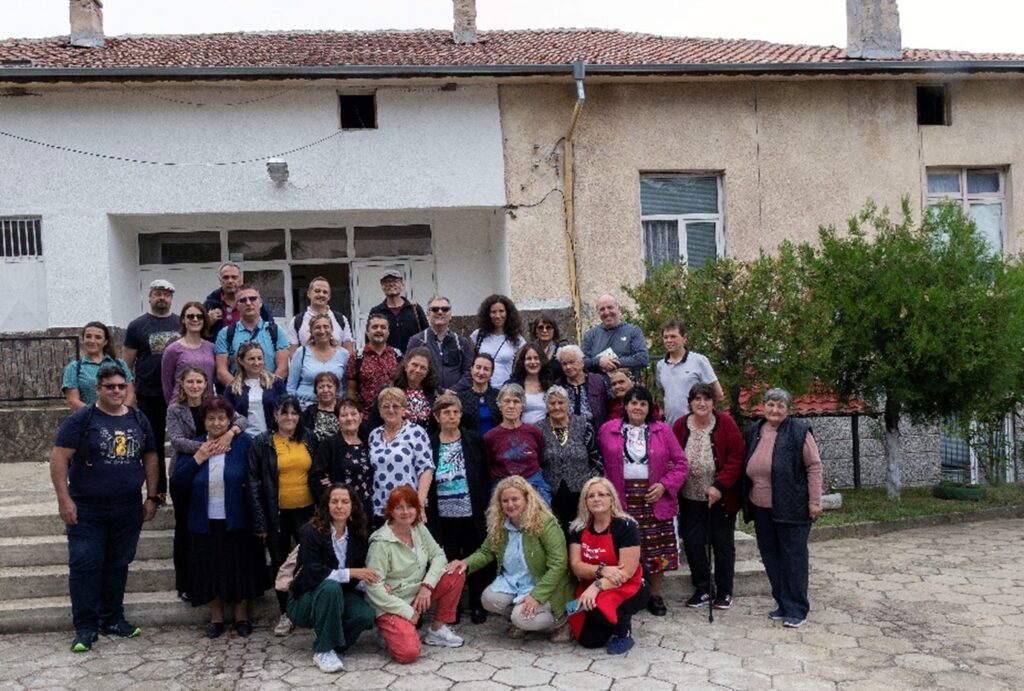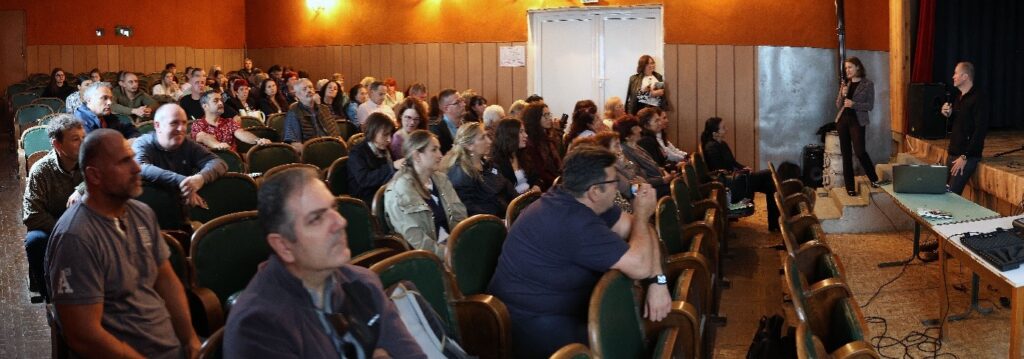By Elena Todorova (Forest Research Institute at the Bulgarian Academy of Sciences)
The recent MARGISTAR Extended Core Group meeting in Sofia gathered leaders from the project’s working groups to assess progress, address ongoing challenges, and outline plans for the next phase of the COST Action. Participants engaged in productive discussions, generating fresh ideas for enhancing community engagement and improving dissemination efforts. Among the key topics was the presentation of case studies and the launch of new tools to support sustainable development. A field visit to Gabrene showcased how local communities are successfully integrating cultural heritage with environmental sustainability to revitalise the region.
Meeting Overview & Strategic Review
MARGISTAR’s Extended Core Group meeting was held in Sofia, Bulgaria from September 17–19, 2024, bringing together team leaders and active members from Working Groups 1, 2, and 3. The gathering focused on evaluating the progress achieved during the second grant period, celebrating key milestones, and outlining priorities for the upcoming third grant phase.
The meeting began with a comprehensive strategic review, reflecting on the three working groups’ tangible achievements and their broader impacts. These included benefits to local communities, advancements in tools and resources, contributions to scientific knowledge, and efforts to strengthen regional networks. Group leaders and co-leaders also openly discussed the challenges they faced, particularly language barriers and the ongoing need to encourage fuller participation from all members.

MARGISTAR’s New Ideas & Discussion Outcomes
Lively discussions led to many new ideas, particularly in the areas of dissemination, community engagement, and the popularisation of results. Suggestions ranged from better ways to promote findings to developing new tools and strategies for activating local communities.
A key focus of the meeting was the presentation of potential outcomes from the 26 case studies and self-organised groups, with participants carefully deliberating on how to best present the results and key messages to MARGISTAR’s public stakeholders. The group decided that, in a first step, these case studies would be compiled into a comprehensive catalogue and made available on the MARGISTAR website. Additionally, the initiative to publish an open-access book in two volumes — one dedicated to the case studies and the other to scientific findings — was officially launched.
A further significant topic of discussion was the MARGISTAR Vision Workshop (MVW) — an instrumental tool for understanding how local communities envision their future and identifying the obstacles that stand in their way. The Vision Workshop toolkit, presented by Dr Irene Christoforidi, Prof Theo Lynn, and Prof Colm O’Gorman, has already been piloted successfully in Croatia. A series of upcoming MVWs is now planned in Serbia, Spain, Ukraine, and North Macedonia. These will be followed by “pathway workshops” designed to craft actionable solutions to the issues identified. A synthesis meeting will later compare the results and facilitate knowledge sharing across regions.

The meeting also touched on new methods for disseminating MARGISTAR COST Action results and proposed innovative tools to support local populations, such as certificates and trademarks. Participants emphasised the importance of concrete steps in network-building and capacity development, ensuring that the efforts go beyond theory and deliver real benefits on the ground.
By the end of the second day, a detailed plan for the next grant period was drafted, including a 2025 scientific conference, a MARGISTAR Training School, grants and funding, Short-Term Scientific Missions (STSMs), and virtual mobility initiatives. Future working group meetings were also scheduled, keeping the momentum going.
Addressing MARGISTAR Challenges & Presenting Solutions
During the meeting, the challenges met in the MARGISTAR project were widely discussed. As a Europe-wide initiative, MARGISTAR brings together people from diverse linguistic backgrounds. While this diversity enriches the project, it also poses communication challenges, particularly during workshops and surrounding dissemination of findings. In Sofia, we addressed the need for translation support and clear communication strategies. One identified solution was to provide key materials in multiple languages, allowing all participants to engage fully.
Another significant challenge is activating members and local communities. Because MARGISTAR aims to engage stakeholders across various countries, MARGISTAR researchers put a lot of effort into involving the communities they work with. This challenge will be met by a series of workshops, trainings, and stakeholder activities to engage and connect people, and build capacity and networks.
Another significant challenge is finding the right balance between creating practical tools and ensuring our work contributes to scientific knowledge. While it is crucial to develop tools with real-world applications for marginalised communities, it is equally important to uphold scientific rigor. To achieve this, we are focusing not only on delivering tangible results, but also on fostering long-term, lasting impacts.

Field Trip: Discovering Local Life & Learnings
On the final day, participants embarked on a field trip to Gabrene, a picturesque village nestled at the foot of the Belasitsa Mountain in Bulgaria’s south-westernmost region. The group received a warm welcome from the local community, including representatives from local authorities, cultural and educational institutions, foresters, beekeepers, and tourism associations.
The visit began with a charming performance by the Gabrene Grandmothers’ Folklore Singing Group, setting the stage for a heartfelt exchange. This was followed by a presentation on the region’s challenges and opportunities over the past three decades, offering valuable insights into the resilience and potential of the local community. The presented local case was a strong example of an activated community continuously raising new initiatives that harmonise nature with tradition.

Supporting Local Efforts for Sustainable Innovation & Cultural Preservation
Gabrene and the nearby villages are located in a remote region that faces significant marginalisation challenges, particularly with infrastructure and demographics. Migration and aging have led to severe depopulation, while the once-thriving chestnut forests, a defining feature of the area, are decaying due to diseases that are difficult to manage.
However, despite these obstacles, local culture centres, NGOs, and activists have found innovative ways to showcase the beauty and charm of these villages. By integrating the region’s natural landscapes, cuisine, culture, and traditions into attractive tourist products, they have successfully appealed to people of all ages and backgrounds. Years of persistent effort have not only energised the local community but also fostered trust, encouraged entrepreneurship, and attracted investment into these remote areas. This revival has brought new life to the villages’ economies and demographics. What is particularly impressive is that all these initiatives have been carried out sustainably, with great care and respect for the natural environment, ensuring that progress goes together with preservation.
MARGISTAR’s Chair, Juha Hiedanpää, introduced the local population to the scope, objectives, and initiatives of the COST Action, as well as examples of periphery traps. Following a delicious lunch prepared by the locals, the scientists engaged in informal discussions with the community, exploring potential ways for collaboration.
The Extended Core Group meeting in Bulgaria not only marked significant milestones for the project, but also laid a strong foundation for future efforts. With a clear roadmap for the third grant period, new tools for community engagement and an inspiring field visit that deepened participants’ understanding of local challenges, the event was both impactful and highly productive.



